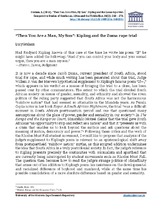| dc.contributor.author | Graham, Lucy Valerie | |
| dc.date.accessioned | 2018-06-08T10:13:16Z | |
| dc.date.available | 2018-06-08T10:13:16Z | |
| dc.date.issued | 2016 | |
| dc.identifier.citation | Graham, L. (2016). “Then You Are a Man, My Son”: Kipling and the Zuma rape trial. Comparative Studies of South Asia, Africa and the Middle East, 36(2): 263 – 274. | en_US |
| dc.identifier.issn | 1089-201X | |
| dc.identifier.uri | http://dx.doi.org/10.1215/1089201x-3603331 | |
| dc.identifier.uri | http://hdl.handle.net/10566/3794 | |
| dc.description.abstract | It is now a decade since Jacob Zuma, current president of South Africa, stood trial for rape, and while much writing has been generated about this trial, Judge Willem J. van der Merwe’s hypothetical supplement to Kipling’s famous poem “If—,” which appears in his verdict as a means of bringing the trial to a close, has been passed over by other commentators. The extent to which the trial divided South African society on issues of gender, sexuality, and ethnicity and showed the riven politics of the ruling party suggested that South Africa was not the harmonious “rainbow nation” that had seemed so attainable in the Mandela years. As Pumla Gqola notes in her book Rape: A South African Nightmare, the trial “was a difficult moment in South Africa’s posttransition period and one that questioned many assumptions about the place of power, gender and sexuality in our society.” | en_US |
| dc.language.iso | en | en_US |
| dc.publisher | Duke University Press | en_US |
| dc.rights | This is the author-version of the article published online at: http://dx.doi.org/10.1215/1089201x-3603331 | |
| dc.subject | Jacob Zuma | en_US |
| dc.subject | Kipling | en_US |
| dc.subject | Rape trial | en_US |
| dc.subject | South Africa | en_US |
| dc.title | “Then You Are a Man, My Son”: Kipling and the Zuma rape trial | en_US |
| dc.type | Article | en_US |
| dc.privacy.showsubmitter | FALSE | |
| dc.status.ispeerreviewed | TRUE | |
| dc.description.accreditation | IBSS | |

